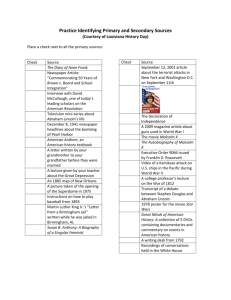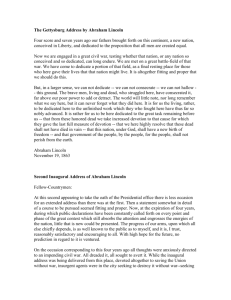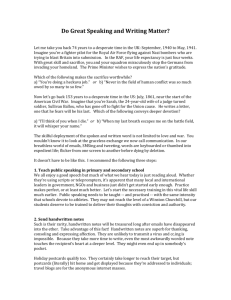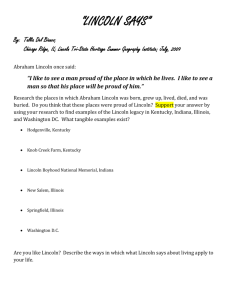Was Lincoln a White Supremacist? GATES: In 1939, after the
advertisement
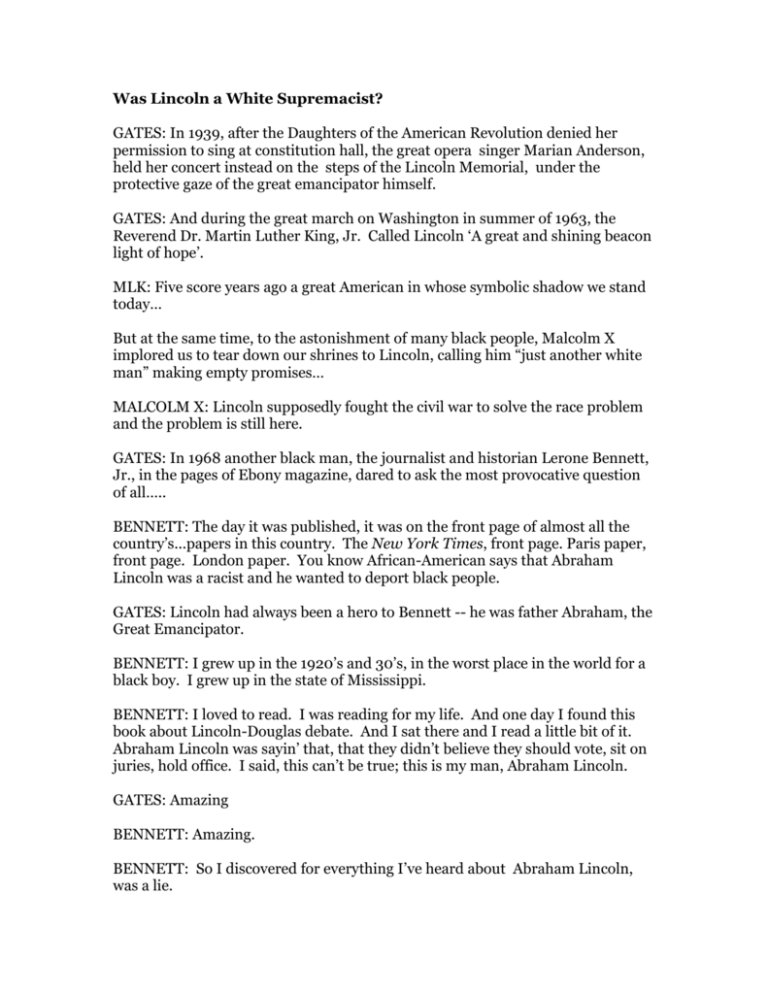
Was Lincoln a White Supremacist? GATES: In 1939, after the Daughters of the American Revolution denied her permission to sing at constitution hall, the great opera singer Marian Anderson, held her concert instead on the steps of the Lincoln Memorial, under the protective gaze of the great emancipator himself. GATES: And during the great march on Washington in summer of 1963, the Reverend Dr. Martin Luther King, Jr. Called Lincoln ‘A great and shining beacon light of hope’. MLK: Five score years ago a great American in whose symbolic shadow we stand today… But at the same time, to the astonishment of many black people, Malcolm X implored us to tear down our shrines to Lincoln, calling him “just another white man” making empty promises… MALCOLM X: Lincoln supposedly fought the civil war to solve the race problem and the problem is still here. GATES: In 1968 another black man, the journalist and historian Lerone Bennett, Jr., in the pages of Ebony magazine, dared to ask the most provocative question of all….. BENNETT: The day it was published, it was on the front page of almost all the country’s...papers in this country. The New York Times, front page. Paris paper, front page. London paper. You know African-American says that Abraham Lincoln was a racist and he wanted to deport black people. GATES: Lincoln had always been a hero to Bennett -- he was father Abraham, the Great Emancipator. BENNETT: I grew up in the 1920’s and 30’s, in the worst place in the world for a black boy. I grew up in the state of Mississippi. BENNETT: I loved to read. I was reading for my life. And one day I found this book about Lincoln-Douglas debate. And I sat there and I read a little bit of it. Abraham Lincoln was sayin’ that, that they didn’t believe they should vote, sit on juries, hold office. I said, this can’t be true; this is my man, Abraham Lincoln. GATES: Amazing BENNETT: Amazing. BENNETT: So I discovered for everything I’ve heard about Abraham Lincoln, was a lie. GATES: Bennett points to Lincoln’s stubborn support for the colonization of freed slaves as proof of his core belief that the races were not equal. GATES: The American Colonization Society was founded by white men in 1816 with the ostensible object of promoting emancipation by sending the freedmen to Africa. Lincoln supported voluntary colonization as part of his solution to the dilemma of what to do with slaves set free into a racist society. In 1858, Lincoln said, “my first impulse would be to free all the slaves and send them to Liberia—to their own native land. What next? Free them and make them politically and socially our equals? My own feelings will not admit this.” BENNETT: The only plan he ever had was gradual emancipation, paying for the slaves, and deporting them. GATES: why has it become a mission for you, why is it so important for you to deconstruct the myth of Abraham Lincoln? BENNETT: Brother Doctor Skip, you can’t defend Abraham Lincoln, without defending slavery. BENNETT: In this period from 1830-1860 one of the greatest generations of white people every produced in this country. They spoke out; they moved blacks on the Underground Railroad. They did everything they could do. 1830, 1840, 1850. For 30 years, Abraham Lincoln was silent. Did not lift a hand to help. BENNETT: I think in Lincoln...Americans see themselves giving freedom to African-Americans and wiping away all the sins of all those years. Lerone Bennett’s work has ruffled the feathers of more traditional Lincoln scholars. While many have lauded his work as a necessary corrective, some have accused him of picking and choosing facts to make his case. GATES: But as I left our interview I was reminded that there is no single way to interpret historical events. BENNETT: in order to remember the redemptive, progressive Lincoln we have to forget what he said in the Lincoln-Douglas debates about racial inequality. Remembering is always about some degree of forgetting. The task of course is not only to just find that balance, the task is to keep reminding ourselves what is worth remembering. GATES: What is worth remembering about the Lincoln story? Is it the tale my grandparents believed – of a righteous savior who set our people free – or is it the story Lerone Bennett tells, of a reluctant politician pulled along by events?

